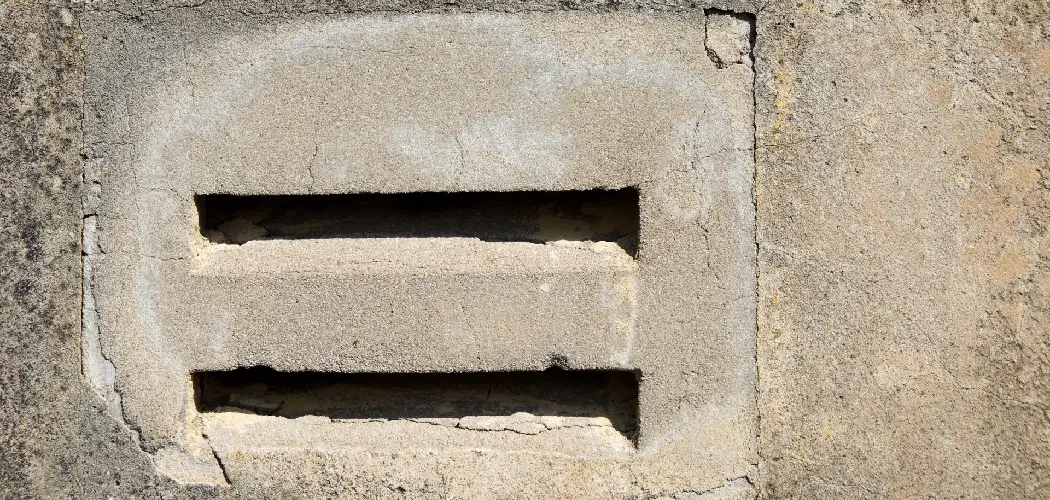Are you facing the problem of clogged drains due to cement? If yes, then you have come to the right place.
For many homeowners, there is nothing more frustrating than having a clogged cement drain. Not only do these issues bring the flow of your water to an unpleasant halt, but they can also be complicated and complex to diagnose and repair.
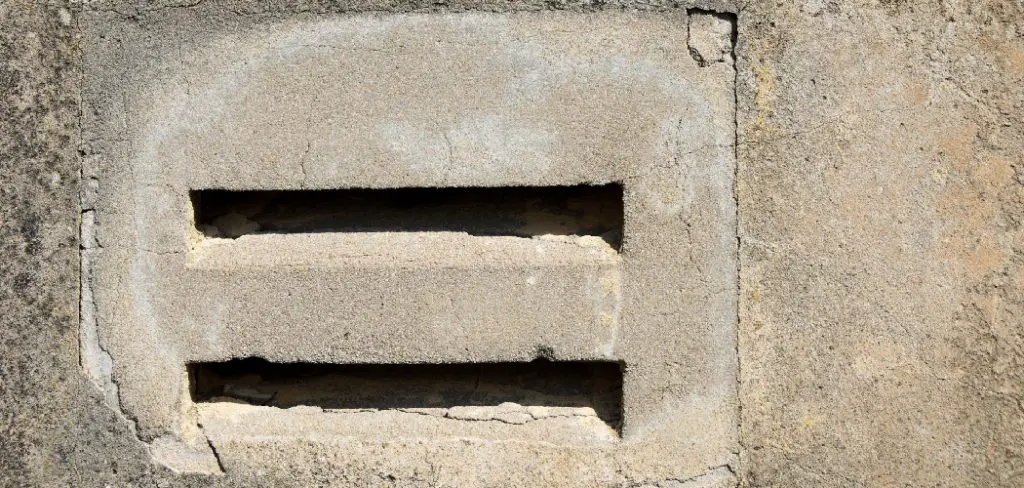
If you’re stuck with a backed-up drain due to accumulated material or debris like dirt, rocks, lint, or other items that get stuck in the pipes, don’t despair – we’ve got plenty of helpful tips on how to unclog cement from drain so that you can save time and money in the long run!
Keep reading for further instructions on how to diagnose your problem accurately and safely remove any blockage for a healthier home plumbing system.
What Will You Need?
- Safety goggles
- Gloves
- Rubber boots
- Plumbers snake or drain auger
- Plunger
Once you have all the necessary equipment, it’s time to start!
10 Easy Steps on How to Unclog Cement From Drain
Step 1: Assessing the Situation
The first step in unclogging a cement drain is determining the blockage’s extent. Is it just at surface level, or has it reached further into your pipes? This will help you decide on the best removal method.
Step 2: Safety Preparations
Before you begin any work, it’s crucial to protect yourself. Wear your safety goggles, gloves, and rubber boots to shield yourself from harm. Remember, the drain could contain harmful bacteria or chemicals that you do not want to come into contact with. Once you are fully geared up, you can proceed to the next step.
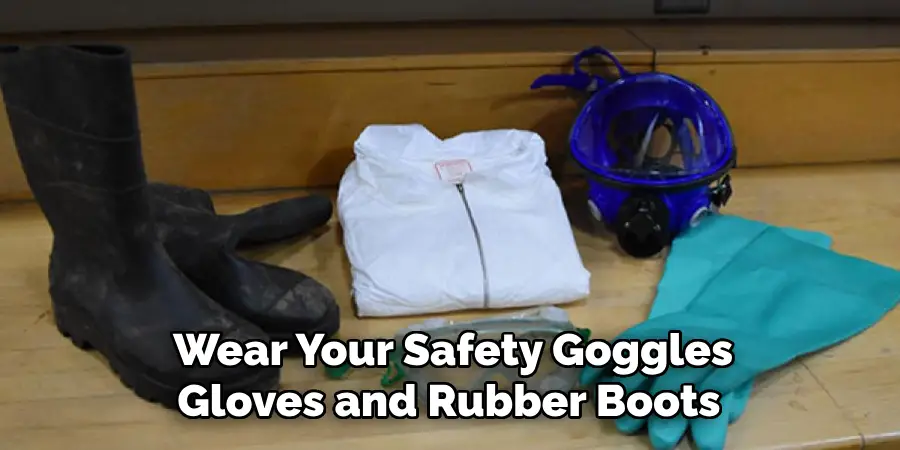
Step 3: Initial Attempt with a Plunger
Start by using a plunger to try and dislodge the cement. Position the plunger over the drain opening and apply forceful plunges to create pressure within the pipes. If the cement is not too far down and fully hardened, it could break it up and allow it to be flushed through the system. If plunging does not progress after several attempts, move on to the next step.
Step 4: Use a Plumber’s Snake or Drain Auger
If the plunger doesn’t work, a plumber’s snake or drain auger can tackle deeper or more stubborn clogs. Insert the end of the snake into the drain, then crank the handle to extend the coil, pushing it further down the pipe. The goal is to reach the blockage and break it up or hook it so it can be pulled out. Be patient and gentle to avoid damaging your pipes. If you cannot remove the blockage with a plumber’s snake, consider the next step.
Step 5: Use a High-Pressure Water Jet
If the plumber’s snake or drain auger fails to unclog the cement, you can use a high-pressure water jet. This tool uses a stream of high-pressure water that can cut through and dislodge the cement blockage. Direct the jet towards the clog and moderate the pressure to avoid damaging the pipes.
The force of the water should break apart the cement, allowing it to be washed away. Remember, if your efforts are not yielding results or if the situation worsens, it might be best to call a professional plumber to avoid causing further damage to your plumbing system.
Step 6: Calling a Professional Plumber
If the cement blockage persists after trying all the above steps, it’s time to call a professional plumber. Dealing with cement in your drain is a serious issue, and if not handled properly, it can cause significant damage to your plumbing system. A professional plumber has the expertise and the right tools to handle such situations.
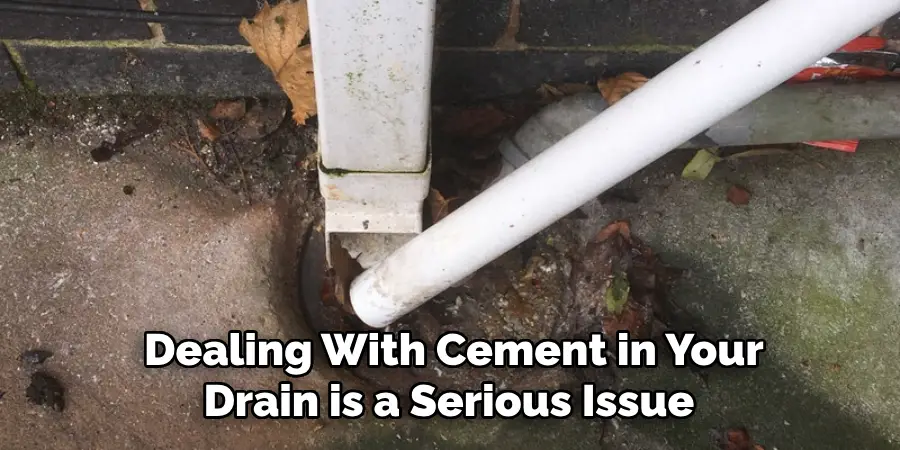
They can accurately diagnose the problem and using specialized equipment, and they can remove the cement without causing further damage to your drain. Remember, it’s always better to get professional help when dealing with complex plumbing issues, especially when cement is involved.
Step 7: Post-Plumber Cleaning
After the professional plumber successfully unclogs the cement from your drain, ensure you thoroughly clean the surrounding area. This prevents any residue cement from further clogging your drain and maintains the cleanliness of your environment.
Use a blend of hot water and vinegar or a commercial drain cleaner to flush through the pipes, ensuring any remaining cement is completely cleared. Regular maintenance of your drains can prevent future blockages.
Step 8: Preventative Measures
To avoid future cement clogs in your drains, it is essential to implement preventative measures. Never pour cement or similar materials down your drains. If you’re doing any construction or renovation work, ensure all drains are adequately covered to prevent debris from entering the pipes.
Regular cleaning and inspections of your drains can also assist in identifying any potential issues before they become significant problems.
Step 9: Regular Inspection and Maintenance
Routine inspection and maintenance of your drainage system is a crucial preventative measure against cement and other clogs. Consider having your drains professionally inspected at least once a year. A plumber can use a special camera to check your drains for any potential blockages or damage, ensuring that your pipes remain healthy and clear.
Regular maintenance also includes using safe, biodegradable drain cleaners periodically to dissolve any minor blockages before they become a problem. Remember, prevention is always better and less costly than repair.
Step 10: Understanding the Consequences
Awareness of the detrimental consequences of cement blockages in your drain pipes can further reinforce the importance of prevention and regular maintenance. Ignored or improperly handled, cement clogs can cause severe damage to your plumbing system – leading to leaks, pipe bursts, and costly repairs.
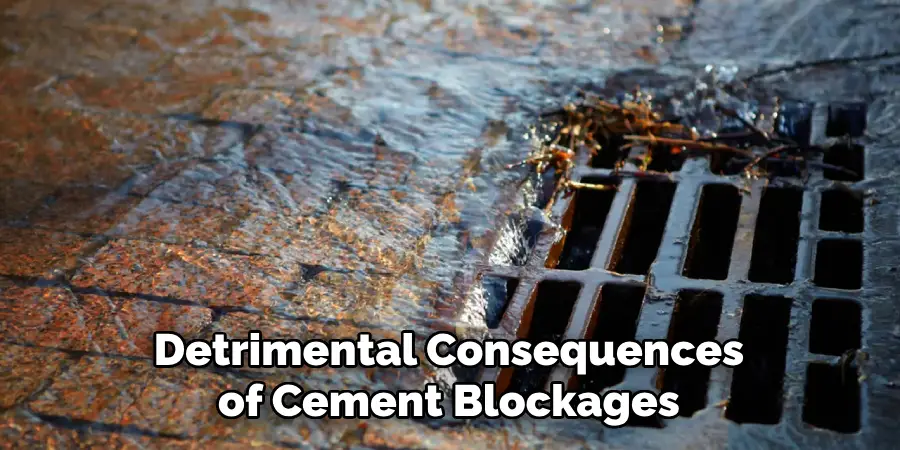
More than just an inconvenience, plumbing issues can affect the structural integrity of your home, reduce its value, and pose health risks due to the growth of harmful bacteria in stagnant water. By being proactive, you can safeguard your home and your health and save on potential repair costs in the future.
Following these steps and taking preventative measures, you can effectively unclog cement from your drain and maintain a healthy plumbing system.
5 Additional Tips and Tricks
- Hot Water Treatment: Regularly flush your drains with hot water. This simple procedure can dissolve minor blockages and keep your pipes clean.
- Avoid Chemical Drain Cleaners: While they may seem practical, chemical drain cleaners can cause more harm than good. They can erode pipes over time, leading to leaks and other major plumbing issues. Opt for natural alternatives like vinegar and baking soda instead.
- Be Mindful of What Goes Down the Drain: Certain substances, including fats, oils, and cement, should never be poured down the drain. These materials can quickly solidify and cause clogs.
- Invest in Quality Plumbing Tools: Having the right tools on hand can make all the difference when dealing with clogs. A good quality plunger, drain snake, and high-pressure water jet can be invaluable.
- Educate Family Members: Make sure everyone in your household understands the importance of maintaining the plumbing system and knows what can and can’t be disposed of in the drains. This will help prevent clogs from occurring in the first place.
With these tips and tricks, you can effectively keep your drains clear of cement clogs and maintain a healthy plumbing system.
5 Things You Should Avoid
- Pouring Cement Down the Drain: This might seem obvious, but it bears repeating. The cement hardens and forms solid blocks that can be extremely difficult to remove from your drainage system. Always dispose of cement properly, not down the drain.
- Using Metal Objects to Unclog Drains: Using a coat hanger or similar object to remove a clog might be tempting, but this could further damage your pipes. Always use tools that are designed for the job.
- Ignoring the Problem: Ignoring a cement clog will not make it go away. It could lead to more severe problems in the future. If you have a clog you can’t clear on your own, call a professional plumber immediately.
- Neglecting Regular Maintenance: Regular maintenance is crucial to keeping your plumbing system in good shape. This includes regular inspections and flushing your drains with hot water regularly.
- Using Caustic Chemicals: While they might clear a clog in the short term, caustic chemicals can cause long-term damage to your pipes. Always opt for gentler, more environmentally friendly options when possible.
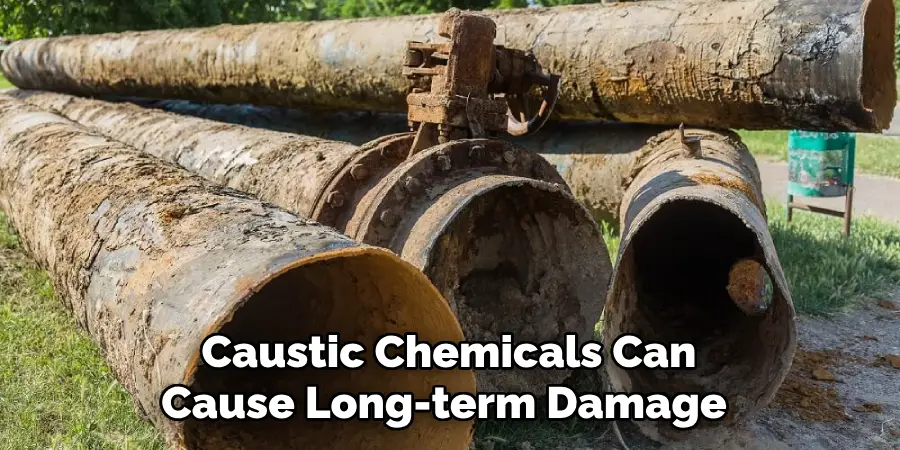
With these tips, you can effectively unclog cement from your drain and maintain a healthy plumbing system for years.
Conclusion
In conclusion, how to unclog cement from drain isn’t something that can be taken lightly, and it’s essential to ensure you take the necessary safety precautions before attempting to do it yourself. Take time to understand the risks of using harsh chemicals or an industrial-grade tool that may damage your pipes.
If in doubt, contacting a professional is always an option and is often much safer for your pipes. Investing in good quality drainage products like drain covers and filters can help minimize future issues with clogged drains caused by cement. As well as ensuring regular maintenance and cleaning of your drains and disposals, you can employ these strategies to prevent any further incidences of clogged cement from occurring.
So don’t hesitate to use these tips before risking expensive repairs!

